2017
Download the 2017 Project Coyote Highlights here.
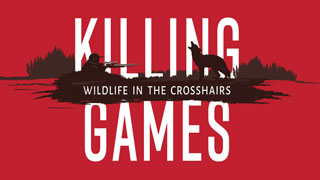
EXPOSING & ENDING CRUELTY
In 2017, Project Coyote launched its documentary film, KILLING GAMES ~ Wildlife In The Crosshairs, a groundbreaking exposé selected by two prominent wildlife film festivals to be part of their tour circuits—Jackson Hole Wildlife Film Festival’s WILD On Tour and Wild & Scenic Film Festival’s Wild & Scenic On Tour. Via these round-the-world touring festivals, the film will reach a global audience, inspiring viewers to help bring an end to brutal killing contests where wild animals become living targets.
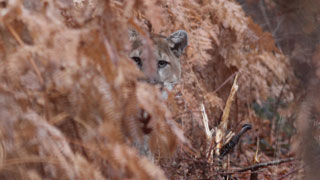
ADVANCING PREDATOR PROTECTION
In a decisive victory for wildlife, a San Francisco federal court approved a settlement requiring the U.S. Department of Agriculture’s Wildlife Services to implement numerous protections for wildlife in Northern California, including a ban on traps and aerial gunning in designated “wilderness areas.” The settlement—in response to a lawsuit filed by Project Coyote and allies—also requires Wildlife Services to analyze the environmental impacts of its killing of coyotes, bobcats, bears, mountain lions, and other wildlife in 16 Northern California counties.
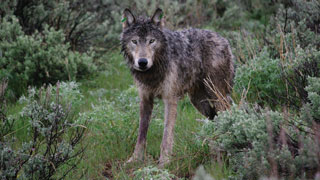
CHAMPIONING BEST SCIENCE
Members of Project Coyote’s Science Advisory Board spearheaded the compilation of a special edition dedicated to predator control for the February 2017 issue of the Journal of Mammalogy. The special edition presents information challenging traditional predator management as practiced by state and federal wildlife management agencies in the U.S. Articles in this issue highlight the negative effects of lethal control on wolves in Idaho, Wisconsin, and Michigan, as well as dingoes in Australia, and document the growing intolerance for lethal and indiscriminate predator control.
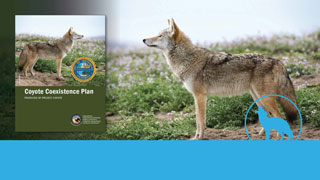
Project Coyote pressed the City of Arcadia, California, to stop indiscriminate coyote trapping, and to instead adopt a coyote management plan that emphasizes public education and coexistence. Project Coyote also assisted two other Southern California cities—West Hollywood and Montebello—in adopting proactive coyote coexistence plans and education programs.
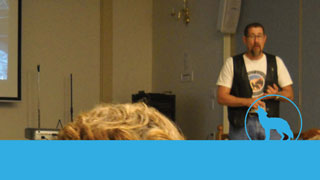
Project Coyote Representative John Maguranis was hired by the state of Massachusetts to offer the first ever state-required course for Animal Control Officers that focuses on coyote ecology, behavior, and non-lethal response protocols.
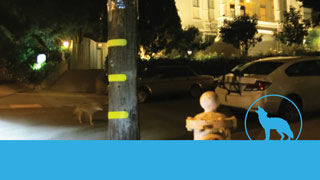
The City of San Francisco declared that “coexistence” will define its living with wildlife ethos, with Project Coyote helping to implement the city’s vision.
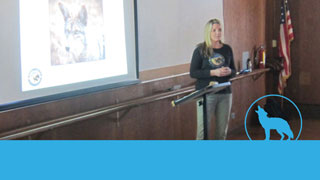
Project Coyote representatives provided Coexisting with Coyotes/Our Wild Neighbors presentations, coyote hazing workshops, and community support in Massachusetts, New Hampshire, Oregon, Arizona, North Carolina, Washington DC, Virginia, Florida, Vermont, California, Nevada, Colorado, Washington, and New Mexico.
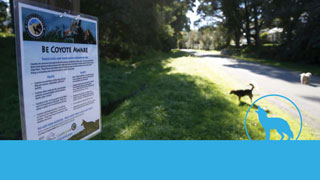
The Marin Coyote Coalition, which includes Project Coyote, provided a series of Coexisting with Coyotes presentations, signage, and public outreach throughout the county.
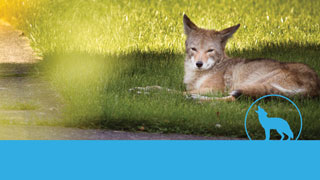
Partnering with Saskatoon—the largest city in Saskatchewan, Canada—Project Coyote helped develop signage and educational outreach.
Project Coyote representatives conducted more than 40 presentations in the U.S. about living with coyotes and other native carnivores, reaching 8,000+ people.
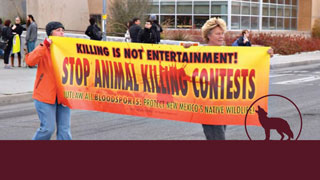
With leadership from New Mexico State Senators Jeff Steinborn (D-Doña Ana) and Mark Moores (R-Bernalillo) and Representative Matthew McQueen (D-District 50), as well as energetic assistance from our New Mexico supporters in the form of phone calls, letters, and testimony, SB 268—which would have banned coyote killing contests statewide—passed in the Senate with bipartisan support but failed to gain a hearing in the House during the 2017 legislative session. With our New Mexico Wildlife Coalition partners, we are working to successfully rejuvenate the bill in the next legislative session in 2019 to ensure that New Mexico outlaws coyote killing contests.
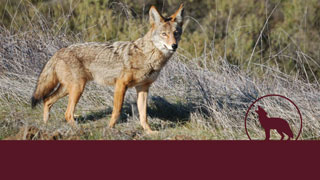
Project Coyote and allies won a settlement against Idaho’s Bureau of Land Management that will ensure public notice of any wildlife killing contests on BLM-managed public lands near Salmon, Idaho.
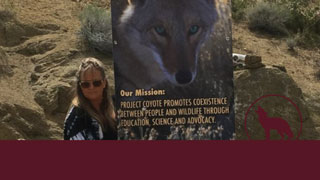
With the help of volunteer Jana Hofeditz and other wildlife advocates, Project Coyote succeeded in stopping two coyote killing contests in Nevada—one in Battle Mountain and one in Lemmon Valley. Our strategic grassroots campaign included targeted media coverage and pressure on event organizers and sponsors.
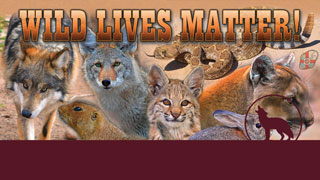
Project Coyote and the Humane Society of the United States joined forces to create a broad-based National Coalition to Ban Wildlife Killing Contests.
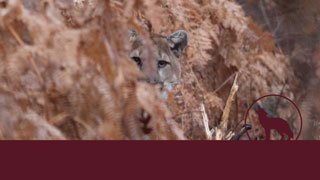
Project Coyote and allies continued to challenge cruel and ineffective state and federal predator management programs:
- Filed a lawsuit resulting in the California Superior Court ruling that Monterey County’s contract with the USDA’s Wildlife Services program for killing and relocating native predators violates state law.
- Joined in suing the California Fish and Game Commission and the Department of Fish and Wildlife for improperly managing and illegally subsidizing commercial and recreational trapping.
- Delivered testimony and close to 50,000 letters and signatures to the California Fish and Game Commission supporting a formal petition to ban lethal trapping and night-time hunting in the state’s wolf recovery zone.
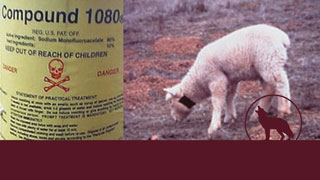
Project Coyote and allies advanced regional and national efforts to ban predator poisons and rodenticides:
- Successfully challenged the use of M-44 “cyanide bombs” by the USDA’s Wildlife Services in Idaho.
- Petitioned the Environmental Protection Agency to outlaw M-44 sodium cyanide devices, which cause agonizing deaths for thousands of animals every year.
- Successfully lobbied for municipal resolutions against the use of deadly rodenticides.
- Pressed for passage of AB 1687 in California to expand prohibitions on pesticides that pose a danger to wildlife.
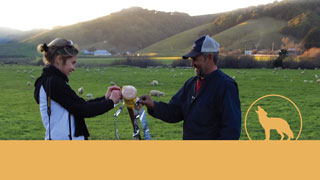
Project Coyote provided Ranching with Wildlife workshops and presentations to multiple communities across the country. Outreach included training in the use of innovative non-lethal predator devices such as Foxlights and E-Shepherd Collars.
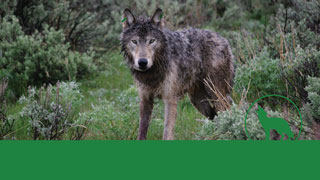
Project Coyote Science Advisory Board member David Parsons submitted comprehensive comments to the U.S. Fish and Wildlife Service regarding its disastrous draft recovery plan for Mexican gray wolves.
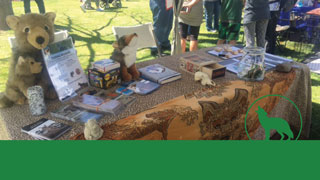
Through various Earth Day events and presentations around the country, Project Coyote representatives and volunteers relayed our message of compassionate coexistence and reiterated the essential role of apex predators in maintaining ecological integrity and biological diversity.
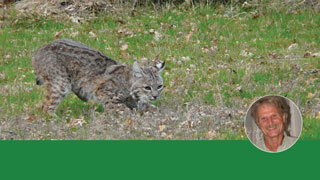
Project Coyote Science Advisory Board member George Wuerthner was named Grassroots Activist of 2017 by the Fund for Wild Nature. The award highlights George’s work to uncover the damaging effects of human activity on wild nature and his successful wildlands restoration efforts.
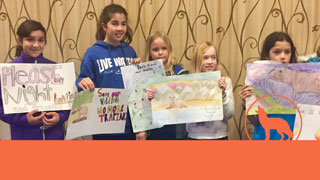
Project Coyote recognized and honored the Fairfax Manor Elementary School’s Green Team and its teacher Laura Honda for student letters, artwork, and testimony before the California Fish and Game Commission in support of successful efforts to ban bobcat trapping, restrict predator killing contests, and afford protections for wolves returning to California.
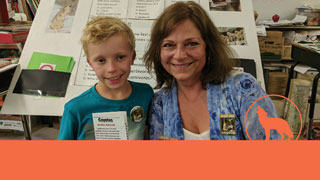
Project Coyote educator Gina Farr provided Ask Me About Coyotes presentations and support to educators and students throughout Marin County.
